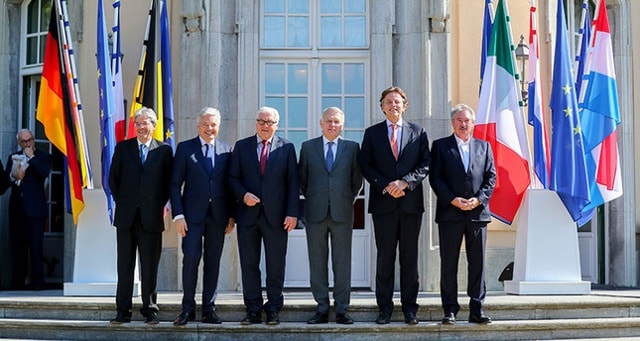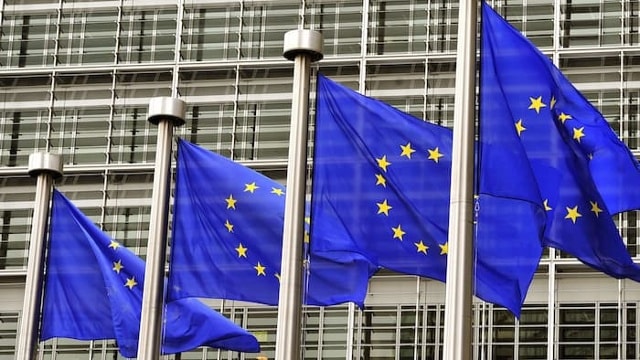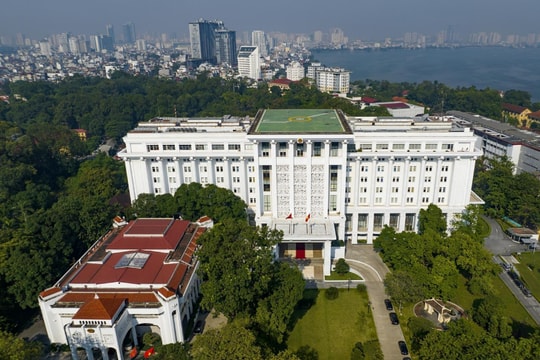Europe frantically searches for 'anti-shock therapy'
(Baonghean) - The historic referendum in the UK with the victory of the Brexit supporters was truly a "shock" to the UK and the entire European Union (EU). However, the truth is the truth and the result of this referendum is irreversible. Currently, Europe must urgently implement "anti-shock measures" so that the EU without the UK does not fall into crisis and paralysis. And one of those measures is to take the UK out of the EU "as quickly as possible".
Speeding up the process of Britain leaving the EU
After the shocking result of the referendum, many British people expressed regret, even those who had voted to “leave”.
 |
| Foreign ministers of the six founding EU member states meet in Berlin, Germany. Photo: EPA. |
There was a time when people tried to cling to a faint ray of hope that there was a way to change this outcome, could the petition with nearly 3 million signatures in just 2 days bring about a second referendum, could any “miracle” happen in 2 years - the time needed to carry out the “divorce procedure” between the UK and the European Union?
But on the European side, the remaining countries will not cling to this ray of hope, but instead will speed up the negotiation process on Britain's exit from the EU, so that the loss of an important member like Britain will be "a clean cut, without any complications".
Under Article 50 of the Lisbon Treaty, members who want to leave the country will have to negotiate the terms of their withdrawal and set out a framework for future cooperation with Europe. Until the withdrawal negotiations are completed, the UK will still be considered a full member of the EU, bound by the bloc's rules and treaties.
Once the UK and EU have reached a final agreement, the document will have to be voted on in the European Council and the UK Parliament. If the EU institutions vote against the document, all sides will have to return to the negotiating table to draft a new treaty. This will be a very complicated process that could take up to two years.
Up to this point, although having chosen Brexit, perhaps the UK itself has not been able to shape its future relationship with the EU. With the announcement that he will resign as soon as the referendum results are out, British Prime Minister David Cameron will "not be foolish" to take on this difficult responsibility. Instead, he affirmed that the UK will only begin negotiations to leave the EU after having a new Prime Minister next fall.
However, at an emergency meeting in Berlin last weekend, the foreign ministers of the six founding EU member states of Germany, France, Italy, the Netherlands, Belgium and Luxembourg called for quick negotiations on Britain's exit from the EU, saying the British government needs to quickly clarify and implement the will of British voters as soon as possible.
European Commission President Jean-Claude Juncker said: "The British have decided that they want to leave the European Union, that does not mean they have to wait until October to negotiate the terms of this process. I want this to start immediately." European Parliament President Martin Schulz also said that Mr. Cameron's time limit was too slow. According to him, London should submit its application by the EU Summit on June 28.
For a sustainable and strong EU
The EU wants to speed up the process of taking Britain out of the EU so that it can focus on its future, so that the EU does not fall into a state of “limbo”. Britain has decided to leave, but the remaining 27 members will still have to survive and find ways to prevent the “domino effect” that many people have mentioned. The security, economic and political structure of Europe has been shaken by the British decision, and Europe needs to fix that.
 |
| The EU needs to continue to exist after Britain leaves. Photo: AFP. |
European Council President Donald Tusk has said that from now on, the European Union will be different. It will not only be about the number of members, but more importantly about how the EU operates. That is why the phrase “EU reform” is being used so often at the moment – a reform that needs to be implemented in practice, not just in statements like before.
Before entering the meeting in Berlin, host country Foreign Minister Frank-Walter Steinmeier said the EU would soon overcome the shock of Britain's departure: "We should not fall into a state of shock or passivity because of the British decision." Mr. Steinmeier also affirmed that now is the time to "listen to the thoughts and aspirations of the remaining 27 EU member states, to see what they want, not only in the leadership of each country but also in each citizen in the bloc."
The aim of the remaining 27 member states is to build a stronger, more determined EU, based on the rule of law and common values. The directions given at the meeting are that Europe will strive to better meet different standards, better meet the expectations of its people, jointly find ways to solve challenges, ensure safety for all citizens; create a common, stable framework to deal with the flow of migrants and refugees; promote sustainable growth of the European economy, create jobs, etc.
Reforming and radically changing the institutions to operate more effectively is the way for the EU to continue to exist without the UK in the future. Brexit has created a “cut” in the history of the formation and development of the EU. But the EU will have to find a way to heal that “cut” quickly, to continue to develop the EU according to the motto that was put forward more than 60 years ago: “unity in diversity”.
Thuy Ngoc
| RELATED NEWS |
|---|








